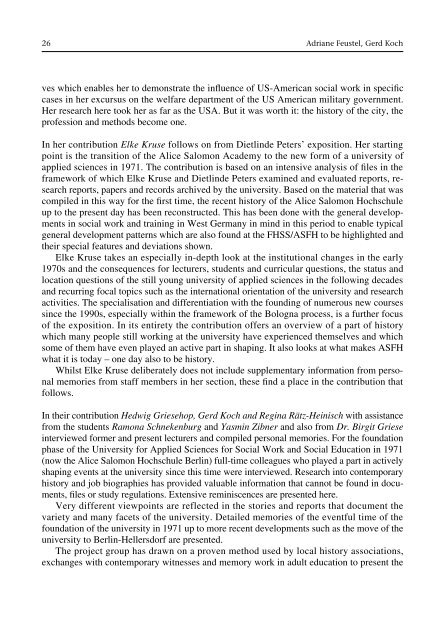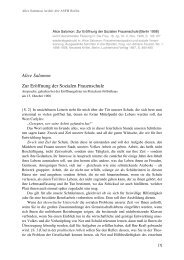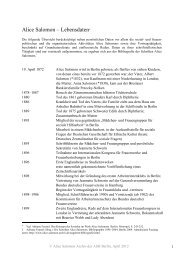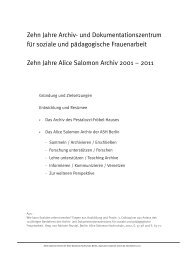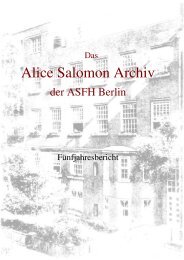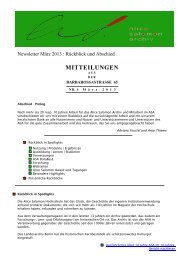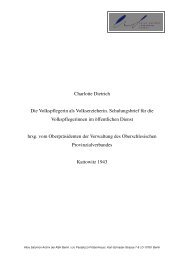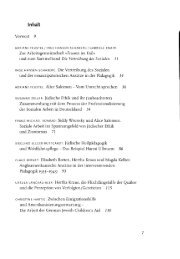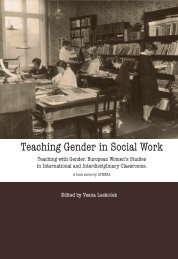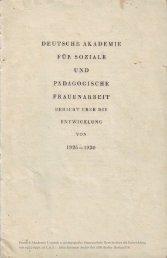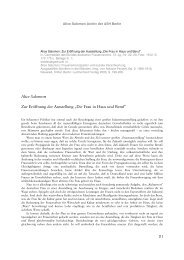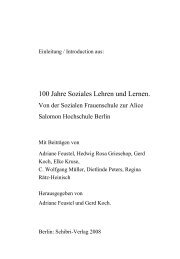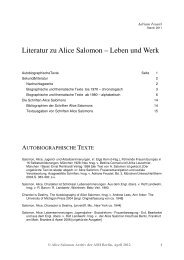100 Jahre Soziales Lehren und Lernen. - Alice Salomon Archiv
100 Jahre Soziales Lehren und Lernen. - Alice Salomon Archiv
100 Jahre Soziales Lehren und Lernen. - Alice Salomon Archiv
Create successful ePaper yourself
Turn your PDF publications into a flip-book with our unique Google optimized e-Paper software.
26 Adriane Feustel, Gerd Koch<br />
ves which enables her to demonstrate the influence of US-American social work in specific<br />
cases in her excursus on the welfare department of the US American military government.<br />
Her research here took her as far as the USA. But it was worth it: the history of the city, the<br />
profession and methods become one.<br />
In her contribution Elke Kruse follows on from Dietlinde Peters’ exposition. Her starting<br />
point is the transition of the <strong>Alice</strong> <strong>Salomon</strong> Academy to the new form of a university of<br />
applied sciences in 1971. The contribution is based on an intensive analysis of files in the<br />
framework of which Elke Kruse and Dietlinde Peters examined and evaluated reports, research<br />
reports, papers and records archived by the university. Based on the material that was<br />
compiled in this way for the first time, the recent history of the <strong>Alice</strong> <strong>Salomon</strong> Hochschule<br />
up to the present day has been reconstructed. This has been done with the general developments<br />
in social work and training in West Germany in mind in this period to enable typical<br />
general development patterns which are also fo<strong>und</strong> at the FHSS/ASFH to be highlighted and<br />
their special features and deviations shown.<br />
Elke Kruse takes an especially in-depth look at the institutional changes in the early<br />
1970s and the consequences for lecturers, students and curricular questions, the status and<br />
location questions of the still young university of applied sciences in the following decades<br />
and recurring focal topics such as the international orientation of the university and research<br />
activities. The specialisation and differentiation with the fo<strong>und</strong>ing of numerous new courses<br />
since the 1990s, especially within the framework of the Bologna process, is a further focus<br />
of the exposition. In its entirety the contribution offers an overview of a part of history<br />
which many people still working at the university have experienced themselves and which<br />
some of them have even played an active part in shaping. It also looks at what makes ASFH<br />
what it is today – one day also to be history.<br />
Whilst Elke Kruse deliberately does not include supplementary information from personal<br />
memories from staff members in her section, these find a place in the contribution that<br />
follows.<br />
In their contribution Hedwig Griesehop, Gerd Koch and Regina Rätz-Heinisch with assistance<br />
from the students Ramona Schnekenburg and Yasmin Zibner and also from Dr. Birgit Griese<br />
interviewed former and present lecturers and compiled personal memories. For the fo<strong>und</strong>ation<br />
phase of the University for Applied Sciences for Social Work and Social Education in 1971<br />
(now the <strong>Alice</strong> <strong>Salomon</strong> Hochschule Berlin) full-time colleagues who played a part in actively<br />
shaping events at the university since this time were interviewed. Research into contemporary<br />
history and job biographies has provided valuable information that cannot be fo<strong>und</strong> in documents,<br />
files or study regulations. Extensive reminiscences are presented here.<br />
Very different viewpoints are reflected in the stories and reports that document the<br />
variety and many facets of the university. Detailed memories of the eventful time of the<br />
fo<strong>und</strong>ation of the university in 1971 up to more recent developments such as the move of the<br />
university to Berlin-Hellersdorf are presented.<br />
The project group has drawn on a proven method used by local history associations,<br />
exchanges with contemporary witnesses and memory work in adult education to present the


